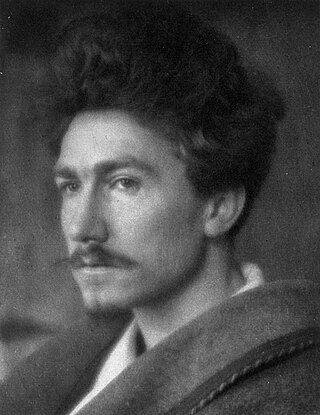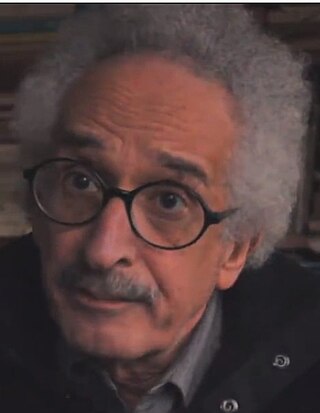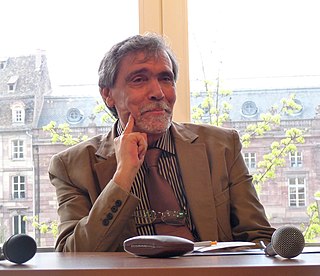Robyn Creswell | |
|---|---|
| Awards |
|
Robyn Creswell is an American critic, scholar and translator.
Robyn Creswell | |
|---|---|
| Awards |
|
Robyn Creswell is an American critic, scholar and translator.
He graduated from Brown University in 1999 and gained a doctorate in comparative literature from New York University in 2011. In addition to teaching comparative literature at Brown University, he also serves as poetry editor of the Paris Review . Creswell's specialization is contemporary Arabic literature.
He has translated several literary works from the Middle East, including That Smell and Notes from Prison by Sonallah Ibrahim and The Clash of Images by Abdelfattah Kilito, and has written numerous essays for various literary periodicals. A revised version of his thesis Tradition and Translation: Poetic Modernism in Beirut (2012) was published by Princeton University Press as City of Beginnings: Poetic Modernism in Beirut (2019).
Creswell won the 2013 Roger Shattuck Prize for Criticism, awarded by the Center for Fiction. [1]
| Year | Review article | Work(s) reviewed |
|---|---|---|
| 2019 | Creswell, Robyn (March 7–20, 2019). "'An enthusiastick sect'". The New York Review of Books. 66 (4): 23–25. |
|

Imagism was a movement in early-20th-century Anglo-American poetry that favored precision of imagery and clear, sharp language. It is considered to be the first organized modernist literary movement in the English language. Imagism is sometimes viewed as "a succession of creative moments" rather than a continuous or sustained period of development. The French academic René Taupin remarked that "it is more accurate to consider Imagism not as a doctrine, nor even as a poetic school, but as the association of a few poets who were for a certain time in agreement on a small number of important principles".
Modernist poetry in English started in the early years of the 20th century with the appearance of the Imagists. In common with many other modernists, these poets wrote in reaction to the perceived excesses of Victorian poetry, with its emphasis on traditional formalism and ornate diction. In many respects, their criticism echoes what William Wordsworth wrote in Preface to Lyrical Ballads to instigate the Romantic movement in British poetry over a century earlier, criticising the gauche and pompous school which then pervaded, and seeking to bring poetry to the layman.
Mimesis is a term used in literary criticism and philosophy that carries a wide range of meanings, including imitatio, imitation, nonsensuous similarity, receptivity, representation, mimicry, the act of expression, the act of resembling, and the presentation of the self.

Ali Ahmad Said Esber, also known by the pen name Adonis or Adunis, is a Syrian poet, essayist and translator. He led a modernist revolution in the second half of the 20th century, "exerting a seismic influence" on Arabic poetry comparable to T.S. Eliot's in the anglophone world.
Modernist poetry refers to poetry written between 1890 and 1950 in the tradition of modernist literature, but the dates of the term depend upon a number of factors, including the nation of origin, the particular school in question, and the biases of the critic setting the dates. The critic/poet C. H. Sisson observed in his essay Poetry and Sincerity that "Modernity has been going on for a long time. Not within living memory has there ever been a day when young writers were not coming up, in a threat of iconoclasm."
Robert Bernard Alter is an American professor of Hebrew and comparative literature at the University of California, Berkeley, where he has taught since 1967. He published his translation of the Hebrew Bible in 2018.
Arabic poetry is the earliest form of Arabic literature. Present knowledge of poetry in Arabic dates from the 6th century, but oral poetry is believed to predate

Marjorie Perloff is an Austrian-born poetry scholar and critic in the United States.

Son'allah Ibrahim is an Egyptian novelist and short story writer and one of the "Sixties Generation" who is known for his leftist and nationalist views which are expressed rather directly in his work. His novels, especially later ones, incorporate many excerpts from newspapers, magazines and other political sources as a way to enlighten the people about a certain political or social issue. Because of his political opinions he was imprisoned during the 1960s; his imprisonment is featured in his first book, That Smell, which was one of the first writings in Egyptian literature to adopt a modernist tinge.

Forrest Gander is an American poet, translator, essayist, and novelist. The A.K. Seaver Professor Emeritus of Literary Arts & Comparative Literature at Brown University, Gander won the Pulitzer Prize for Poetry in 2019 for Be With and is chancellor of the Academy of American Poets and a member of the American Academy of Arts and Sciences.
Jabra Ibrahim Jabra was an Iraqi-Palestinian author, artist and intellectual born in Adana in French-occupied Cilicia to a Syriac Orthodox Christian family. His family survived the Seyfo Genocide and fled to the British Mandate of Palestine in the early 1920s. Jabra was educated at government schools under the British-mandatory educational system in Bethlehem and Jerusalem, such as the Government Arab College, and won a scholarship from the British Council to study at the University of Cambridge. Following the events of 1948, Jabra fled Jerusalem and settled in Baghdad, where he found work teaching at the University of Baghdad. In 1952 he was awarded a Rockefeller Foundation Humanities fellowship to study English literature at Harvard University. Over the course of his literary career, Jabra wrote novels, short stories, poetry, criticism, and a screenplay. He was a prolific translator of modern English and French literature into Arabic. Jabra was also an enthusiastic painter, and he pioneered the Hurufiyya movement, which sought to integrate traditional Islamic art within contemporary art through the decorative use of Arabic script.
Richard Sieburth is Professor Emeritus of French Literature, Thought and Culture and Comparative Literature at New York University (NYU). A translator and editor, Sieburth retired in 2019 after 35 years of teaching at NYU and 10 years at Harvard.

Abdelfattah Kilito is a Moroccan writer. He is the author of several books in Arabic and in French. He has also written articles for magazines such as Poétique and Studia Islamica. Some of the awards Kilito has won are the Great Moroccan Award (1989), the Atlas Award (1996), the French Academy Award (1996) and Sultan Al Owais Prize for Criticism and Literature Studies (2006).
Alberto Acereda is a Spanish former professor who currently works as Associate Vice President in the Global Higher Education Division at Educational Testing Service (ETS) in Princeton, New Jersey. He provides overall leadership for business development initiatives and academic outreach in global and higher education. Previously at ETS he worked as Senior Director of Business Development and as senior strategic advisor to the Vice President and COO of higher education. Prior to joining ETS in 2012, he spent nearly twenty years at various universities and graduate programs across the United States.
The Banipal Prize, whose full name is the Saif Ghobash–Banipal Prize for Arabic Literary Translation, is an annual prize awarded to a translator for the published English translation of a full-length literary work in the Arabic language. The prize was inaugurated in 2006 by the literary magazine Banipal which promotes the diffusion of contemporary Arabic literature through English translations and the Banipal Trust for Arab Literature. It is administered by the Society of Authors in the UK, and the prize money is sponsored by Omar Saif Ghobash and his family in memory of Ghobash's late father Saif Ghobash. As of 2009, the prize money amounted to £3000.
Yopie Prins is Irene Butter Collegiate Professor of English and Comparative Literature at the University of Michigan. Her research includes classical reception, comparative literature, historical poetics, lyric theory, translation studies, Nineteenth-Century poetry, English Hellenism, and Victorian poetry.

Virginia Walker Jackson is UCI Endowed Chair in Rhetoric at the University of California, Irvine. She is one of the founders of historical poetics and of the new lyric studies, and is credited with "energiz[ing] criticism" about Emily Dickinson in the twenty-first century. She is more recently credited with revising the racialized history of American poetics, as the poet Terrance Hayes writes, “If there is a kind of ‘poet’s poet,’ might there also be a kind of ‘poet’s scholar,’ someone a poet reads for lucid, explosive doses of insight and history? Yes: Virginia Jackson. Actually, she’s more than a poet’s favorite scholar, she is a poet’s favorite pathfinding detective. Her brilliant Before Modernism is a radical reorientation of American lyric literary assumptions. Virginia Jackson unearths the overlooked, undervalued Black poets at the root of modern American poetry, and every branch of contemporary poetry trembles with new fruit.” Her research includes nineteenth-century American poetry, the history of American poetry, comparative literature, lyric theory, the history of criticism, the history of poetics, and genre theory.
Shi'r was an avant-garde and modernist monthly literary magazine with a special reference to poetry. The magazine was published in Beirut, Lebanon, between 1957 and 1970 with a three-year interruption. The founders were two leading literary figures: Yusuf al-Khal and Adunis. It was named after Harriet Monroe’s Chicago-based magazine, Poetry.
Al Adab was an Arabic avant-garde existentialist literary print magazine published in Beirut, Lebanon, in the period 1953–2012. It was restarted in 2015 as an online-only publication. Encyclopædia Britannica describes it as one of the leading publications founded in the Arab countries in the latter half of the 20th century. Although the magazine was headquartered in Beirut, it was distributed all over the Arabic-speaking regions.